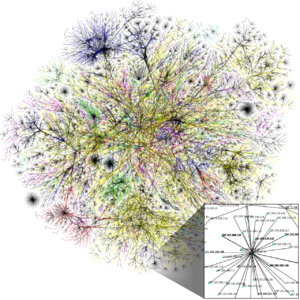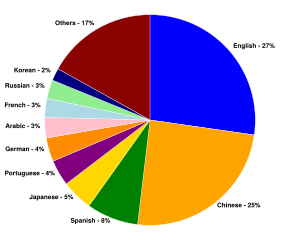Internet facts for kids
The Internet is the biggest worldwide communication network of computers. It's a huge network that lets us share information, play games, watch videos, and talk to people all over the globe, even those who live very far away.
Contents
History of the Internet
How the Internet Started (1960s-1980s)
The Internet didn't just appear overnight. It was built step by step. It began in the 1960s when scientists wanted to create a communication system. This system needed to keep working even if one part was damaged. This idea led to ARPANET (Advanced Research Projects Agency Network) in 1969. ARPANET was the very first network that grew into the Internet we use today.
ARPANET was a small network at first. It connected only four computers at universities in the United States. Imagine it like a tiny spiderweb. The first message was sent on October 29, 1969. It was supposed to be "LOGIN," but only "LO" was sent before the system stopped working. Even in the beginning, there were challenges!
In the 1970s and 1980s, more computers joined the network. Scientists created new ways to connect them. They made protocols, which are like rules that let computers "talk" to each other. Think of it like learning a new language to speak with someone from another country. One very important set of rules was TCP/IP (Transmission Control Protocol/Internet Protocol). It was created in 1983. This is still the main language the Internet uses today.
The World Wide Web (1989-Today)
Even with ARPANET, it was hard for regular people to use the network. Then, in 1989, a scientist named Tim Berners-Lee invented something amazing: the World Wide Web. This was like adding a super easy-to-use map to the giant Internet spiderweb. The World Wide Web uses "hypertext." These are clickable words and pictures that take you to different pages of information. This made the Internet much easier to use.
The World Wide Web uses HTTP (Hypertext Transfer Protocol). This is another important set of rules. It allows computers to share web pages. Think of it like directions on a map. It tells your computer how to find and show you specific information.
The World Wide Web grew very quickly. In 1991, the first web browser was created. It was also called WorldWideWeb. Web browsers are like the windows through which we see the Internet. Soon, other browsers like Netscape Navigator and Internet Explorer were made. These made it even simpler for people to explore the Internet.
The Internet Today
Today, billions of people around the world use the Internet. It has changed how we communicate, learn, work, and have fun.
- Communication: We can instantly message friends and family across continents. We can video chat with loved ones. We can even have online meetings with people from different countries.
- Education: There are tons of online learning resources. You can find educational websites and online courses from universities worldwide. You can learn anything you want, from the history of ancient Egypt to how to code a video game!
- Work: Many people work from home. They connect to their offices using the Internet. Online businesses let people buy and sell things all over the globe.
- Entertainment: We can watch movies and TV shows whenever we want. We can listen to music, play video games online with friends, and explore countless websites for fun.
The Future of the Internet
The Internet is always changing and getting better. New technologies, like faster Internet speeds and artificial intelligence, are changing how we use it. In the future, we can expect even more amazing things. This might include more realistic virtual reality experiences and smarter ways to find information.
Online Safety and Dangers
The Internet makes communication easy. But sometimes, communication can be risky. People might send private information. Sometimes, others can try to steal that information. They can also use the Internet to spread false information or bad advice.
- Some websites might trick people into downloading viruses. These can harm your computer. Or they might download spyware that watches what you do online.
- Emails can have harmful files called "attachments."
- In online chatrooms, some people might try to trick or harm others.
- The Internet has content that many people find inappropriate.
- Criminals may steal people's personal information. They might also trick people into sending them money.
Remember, the Internet is a powerful tool for learning, connecting, and having fun. Always be safe online. Ask a grown-up if you have any questions! Have fun exploring the amazing world of the Internet!
Staying Safe Online
Here are some basic rules for staying safe online.
Keep Your Personal Information Private
Personal information is anything that can identify you. This includes your name, address, phone number, school, or birthday. Sharing this information can let strangers know too much about you. This could be unsafe. Never share your personal information online without asking a trusted adult. This includes on social media, in games, or on websites.
Use Strong Passwords
A strong password is a secret code that protects your online accounts. Weak passwords are easy for others to guess. This means someone could get into your accounts and pretend to be you. Use a mix of uppercase and lowercase letters, numbers, and symbols. Make your password at least 12 characters long. Don't use the same password for all your accounts. A good way to remember a strong password is to use a phrase. It should be easy for you to remember but hard for others to guess. For example, "I love to read books about space!" could become "Il2rbaS!".
Think Before You Click
Be careful about clicking on links or downloading files from unknown sources. Some links and files can contain viruses. They might also lead to websites that try to trick you into giving away your personal information. If you don't know where a link or file comes from, don't click on it. Always ask a trusted adult if you're not sure.
Be Kind Online
Treat others with respect and kindness. Do this just like you would in real life. Cyberbullying (bullying that happens online) can be very hurtful. It can also have serious consequences. Never say anything online that you wouldn't say in person. If someone is being mean to you or others, tell a trusted adult.
Keep Your Software Updated
Install updates for your computer, phone, and apps. This helps protect against security problems.
Use Antivirus Software
Install antivirus software on your computer. This protects against viruses and other harmful programs.
Talk to a Trusted Adult
If anything online makes you feel uncomfortable, scared, or confused, talk to a trusted adult. This could be your parents, teachers, or a school counselor. Don't be afraid to ask for help. Adults are there to support you and keep you safe.
Interesting Facts About the Internet
- The Internet is so big that it's impossible to know exactly how many websites there are.
- As of early 2024, approximately 5.3 billion people around the world use the internet. That's about 66% of the entire global population!
- The Internet handles an unbelievable amount of data every second. This data includes everything from emails and social media posts to online videos and money transactions.
- While the internet's exact "birthday" is debated, the first message was sent over ARPANET in 1969. It was just two letters: "LO" (they were trying to type "LOGIN" but the system crashed!)
- Tim Berners-Lee, the man who invented the World Wide Web, also created the first website.
- As of 2024, watching videos and using communication apps are among the top activities people do online.
- More than half of all internet traffic worldwide comes from mobile phones! This means more people are using their phones to go online than any other device.
Related pages
Images for kids
-
The Internet Messenger by Buky Schwartz, located in Holon, Israel
-
The ICANN headquarters in Playa Vista, California, United States.
-
This NeXT Computer was used by Tim Berners-Lee at CERN. It became the world's first Web server.
See also
 In Spanish: Internet para niños
In Spanish: Internet para niños
 | Bayard Rustin |
 | Jeannette Carter |
 | Jeremiah A. Brown |









